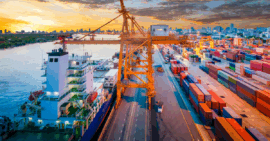We are currently riding a rollercoaster of new U.S. tariffs and retaliatory measures, which is stirring up an avalanche of uncertainty for global enterprises.
Having already faced U.S. tariff hikes on goods from Canada, Mexico, and China, alongside industry-specific tariffs on steel, aluminium, and the automotive sector, the landscape of global trade took a dramatic turn on ‘Liberation Day’, April 2nd.
On this day, President Trump announced sweeping reciprocal tariffs on imports from all countries, with rates ranging from a baseline 10% to a staggering 50%.
This announcement sent shockwaves through global supply chains, prompting businesses everywhere to reevaluate their costs, rethink their sourcing strategies, and consider long-term investments to navigate this new reality.
And then, just as quickly, by April 9th, the reciprocal tariffs were paused, leaving everyone in a state of widespread uncertainty once again.
It is fair to say that in this increasingly complex and rapid paced regulatory landscape, global trade compliance professionals are facing significant challenges.
AI to address the ‘skills gap’ in global trade
In today’s geopolitical environment, a sophisticated understanding of trade regulations as they happen is more critical than ever, elevating the role of global trade professionals and the technology that supports them.
The complexities of modern global trade stem from two main factors:
- a volatile regulatory environment
- rapid technological advancements.
These factors have heightened the demand for a diverse skill set that melds technical expertise with a profound understanding of global politics and economics. This shift has resulted in a persistent ‘skills gap’, making it challenging for companies to fill essential trade management roles. Enter AI, our beacon of hope for achieving future efficiency and empowering teams beyond our wildest dreams.
Those who know me well understand that I am a staunch AI advocate. The impossible, once out of reach, can now be possible. However, it concerns me that many are turning to general-use AI tools to navigate the complexities introduced by the escalating tariff wars, with an expectation that they can provide the current insights needed to stay informed and compliant.
These tariffs have reshaped the global trade landscape, and while AI tools promise to simplify this daunting terrain, relying on them for compliance can be risky. Purpose-build tools for trade compliance professionals are the answer.
We must use AI responsibly and ethically, recognising its limitations and understanding where it may not provide the solutions we need. The key is to ensure that AI complements, rather than replaces, the critical insights and expertise of trade professionals who are navigating these turbulent times.
Thomson Reuters adopts eight Data and AI Ethics Principles to promote trustworthiness in the continuous design, development, and deployment of AI and its use of data.
This underscores the need for responsible AI solutions tailored to these complexities. Responsible AI, backed by expert insights and comprehensive regulatory content, can empower trade compliance professionals to navigate the complexities of tariff changes with confidence.
What is responsible AI in global trade compliance?
Responsible AI is a guiding principle for the ethical and effective deployment of artificial intelligence technologies. In the realm of global trade compliance, it refers to AI systems that are:
- Transparent: Providing clear explanations for decisions, building trust with users.
- Fair and Non-Discriminatory: Ensuring unbiased outcomes, preventing discrimination.
- Accountable: Subject to rigorous testing and validation, with traceable outcomes.
- Secure: Prioritising data privacy and protection, complying with relevant regulations.
The skills gap in global trade management further complicates the landscape. As highlighted in the recent Thomson Reuters Institute (TRI) Global Trade Report, the increasingly data-intensive nature of global trade requires professionals with strong technical skills and broad regulatory knowledge. This demand for a diverse skill set has made it challenging for companies to attract and retain talent.
To address this skills gap, companies must invest in both technology and talent development. Upskilling employees and upgrading technology go hand in hand, enabling organisations to leverage AI effectively.
By fostering a culture of continuous learning and technological advancement, companies can equip their trade compliance teams with the tools and knowledge needed to thrive in a dynamic environment.
The role of responsible AI in addressing challenges
Responsible AI acts as a pivotal tool for overcoming challenges such as the skills gap and the fast-evolving regulatory environment. By integrating responsible AI, companies can:
- Enhance the capabilities of trade compliance teams, focusing on strategic decision-making.
- Automate data-intensive tasks, allowing professionals to upskill and focus on higher-value activities.
- Foster innovation and continuous improvement, essential for navigating global trade complexities.
This aligns with the TRI report’s findings, emphasising the necessity for both technological proficiency and regulatory acumen.
An AI-enabled future
As global trade continues to evolve, the need for responsible AI becomes increasingly imperative. Companies that prioritise responsible AI will not only ensure compliance but also gain a competitive edge by making informed, strategic decisions in a turbulent market.
By aligning AI initiatives with ethical standards and expert insights, businesses can achieve operational excellence and drive sustainable growth in the global marketplace.
While we have only started the journey towards fully realised AI solutions in global trade compliance, the prospect of an AI-enabled future is something to get excited about.
This future holds the promise of not only navigating the complexities of global trade with greater confidence but also fostering a new era of innovation and strategic success.
Until that day comes however, it is crucial to remember the limitations of relying solely on general-purpose AI to support trade compliance management.
The risks of incomplete insights and potential errors underscore the need for AI solutions that are tailored to the unique demands of the trade sector.
Discover ONESOURCE Global Trade Content for unparalleled coverage of foreign trade regulations and regulatory knowledge.



